
BIOLOGY 103
Fall, 2006
Fall, 2006

 |
Fall, 2006  |
Biology -> Science of life
Raises further interesting/relevant questions ...
Science as process ... of Story Telling and Story Revision
| Linear science | Seriously loopy science |
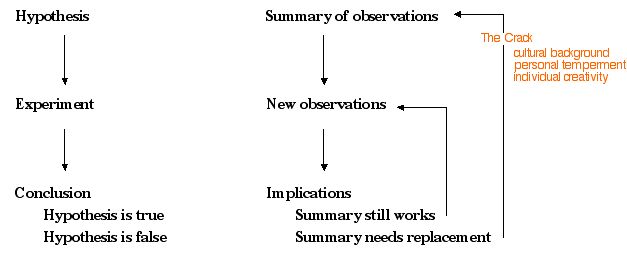 | |
| Science as body of facts established by specialized fact-generating people and process
Science as successive approximations to Truth
| Science as process of getting it less wrong, potentially usable by and contributed to by everyone
Science as ongoing story telling and story revision: repeated making of observations, interpreting and summarizing observations, making new observations, making new summaries ... individually and collectively Science as skepticism, a style of inquiry that can be used for anything, one which everybody is equipped to to/can get better at/be further empowered by, and contribute to - a way of making sense of what is but even more of exploring what might yet be |
Science as practical tool, continually being adapted and therefore
|
|
Scientific stories are frequently efforts to summarize the widest possible range of observations, always motivate new observations and hence new stories, should never be understood as "authoritative" or "believed in", do not compete with or invalidate other stories.
Key issues about scientific stories
|
|
To be honest before taking this class not only did I hate science, I also was scared because I thought that this subject was only for geniuses. By taking this class I have not only changed my mind about science I have also learned that all of us can understand it because is part of our daily lives ... Ingrid I always thought of scientific conclusions as concrete truths, whereas now I know that nothing is ever certain. I tend to take scientific articles too seriously, but now that I know to approach these studies with scepticism, I don't feel as vulnerable ... Sarah M. I find biology really fascinating in particular because I'm curious about the way the world works (and for that matter, how I work), and biology gives me those answers. Granted, we spent all of last class talking about the fallability of science, but no matter how politically incorrect it is to call something "scientific fact," I'm perfectly comfortable using that term - it doesn't prevent me from realizing that there's always something new to be discovered ... Meagan One thing that I like about the nature of this biology class is that the so-called truth is in a process of evolution, and finding the truth, in fact, is not as important as the journey or quest itself ... Randomness resonates with me and I was glad to see it plays a part in science, along with getting it wrong ... Sarah G. Science has always been portrayed as knowing all the answers,and knowing how to apply them to everyday life. To hear that there are a lot of things that science can't explain, and that randomness is relied on after a certain point, is strange. It also brings about the question, if nothing can be proven certain, and if certain things can only be explained, why bother at all? And also, can't randomness be overused to explain things that are possible to find out, but that just haven't been yet? ... cmccnally The interminable battle between Faith and Science continues ... We spoke in class about the strict, reasonable trial and error process and how it cannot in truth lead scientists to be absolutely sure of anything anywhere in the world. This requires some belief in science then, to TRUST that the sun will rise and set tomorrow and that gravity won't switch off suddenly. And that is where faith quietly comes in ... Carolina (see also Arielle, Annabella and Evolution and Intelligent Design: Perspectives and Resources and The Power of Social Psychological Interventions) because of recent class discussion involving seriously loopy science and the revelation that white lab coats are not needed to make observations and conduct experiments, I have realized that although I might feel one way about a particular subject, I am going to constantly reevaluate why it is that I feel this way, perhaps make some new observations, and change, or not change, accordingly ... Corey So with all this talk about the scientific method vs. seriously loopy science, I was a little disappointed to open my brand new $100 (paperback) text book for anthro and find "The Scientific Method Explained" ... "The goal [of science] isn't to establish "truth" in any absolute sense, but rather to generate ever more accurate and consistent explanations of phenomena in our universe." ... Georgia Harold Osborne, a British aesthetician ... Simone |
Which of the following stories do you prefer?
Life as ... process?
(starting where one is, telling a story, getting it less wrong)
Practical issue related to really major "getting it less wrong"
Characteristics of a living thing?
| What's alive here? | Is Langton's ant alive? |
|---|---|
 |  |
| from Sahara Meteorite Prospecting | from The World of Langton's Ant: Thinking About "Purpose" |
| I believe all things are alive. As another student bravely put forth in class, if it is on the earth, it is living ... it is the notion that the Earth does not fall into the narrow common sense parameters of what is alive (in western thought) that makes it OK to not treat it as if it were alive ... Annabella
if something consciously utilizes nature in order to maintain some sort of active status then it is alive ... Katherine F inanimate, animate, conscious - useful distinctions? |
Defines some of the phenomena that need to be accounted for in course (or, at least, by biologists over time). But is not sharp (mule that can't reproduce?, person in a coma?, Langton's ant?, artificial life?, products of life?, viruses? earth? rocks?) ... maybe life is not something things have (no elan vital) but instead ... ? Maybe there isn't a sharp border between living and non-living things? Like particular stories aren't "scientific" in and of themselves but rather as part of an ongoing process? And the list in any case doesn't include ALL of the things that biologists need to make sense of .... what needed beyond characteristics of a living organism to define "life"?
Additional defining characteristics of life
| Diversity "neither incidental nor detrimental ... instead essential" | ||
|---|---|---|

| 
| 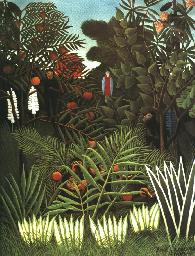 |
|
| Interactivity | ||
|---|---|---|
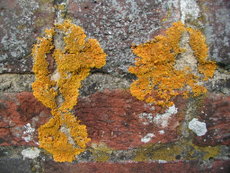
| 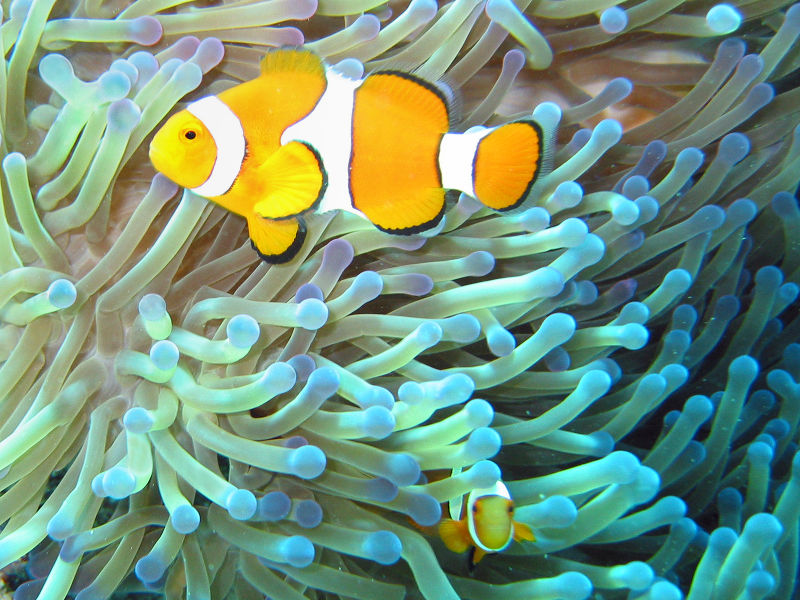
| 
|
| Change over time | ||
|---|---|---|

| 
| |
|
Have to think about not only here/now but also there/then.
Life as process: Interdependent diversity, change over time
|
|
The theme of this week seemed to be the importance of not taking things for granted and not making assumptions: thinking about life, where we came from, and how we continue to exist, things that (ironically) are very easy to ignore ... Hannah seemingly basic questions have resulted in philosophical and religious arguments and have forced us as students to look beyond what we were forced to memorize in high school biology class. Sadly, my natural response to questions like "what charaterizes life?" is whatever I was force fed in high school. I love the way this class actually forces me to THINK, question, and observe natural phenomena. For example, in retrospect the concept that living things are highly improbable assemblies seems basic, however, it took us an entire class to even come near this conclusion ... Sarah I think life and death are probably the most important distinguishing categories of all words, but probably the most frightening, since neither can be controlled by humans and both change as time goes on. It's interesting to take what we've learned and break it apart, seeing all the stuff we've just assumed forever, and now actually thinking about it and realizing we may not see it the same way ... Karen While reading this article, I began to wonder, if people consider the earth to be alive, are the other planets alive as well? What are the reasons or justifications for saying that the earth is alive? Is the earth alive just because there are living things on it or is it something else? If not, could this newly found, puffy planet be alive as well? What about Mars, where water was found recently. If there is life on Mars, is Mars alive too? Just a thought that I hope will spark interesting and informative debate ... One last thing on the same topic of whether or not the earth is alive ... Just because I do not think that the earth is a living thing does not mean, in any way, that I treat it badly ... Corey Maybe by the end of the semester we'll be able to answer ... questions about whether there is a "right way" to categorize things... Simone There was one thing I caught it class though that made me think. The possibility of categorizing life into:
I'm also interested in the idea of a distinction between animate, inanimate, and conscious, and how that applies in medical situations. I had a friend once ... Meagan Professor Zajonc told us that in the study of science one starts on a large scale and moves to smaller and smaller levels of structure and function. He told us that everything is ordered and makes sense on each level, that it is clear how things function and give rise to the order on the level following them. Eventually though, he said, on the lowest level that science has been able to discover, there is utter chaos. The question here is how does this chaos suddenly jump into order on the next level up? What force creates order out of chaos... Ananda |
An Overview: Spatial Scale and Diversity
Lessons from working up in scale from human ...
And from working down in scale ...
(Why no big unicellular organisms? - need for communication/integration?)
Starting with intuitions (as we did with "life", as one always should, in science and elsewhere): what things LOOK like and do
What is similar to what, how similar, how many relevant axes?
Are there "discontinuities" in life's diversity?
| Diversity is "clumpy" - the kinds of existing organisms are not randomly distributed among all possible kinds; instead there are lots of variants of a smaller number of more general kinds of organisms |
Plants versus animals versus fungi(?)
Autotrophs versus heterotrophs (interdependence)
With cell wall versus no cell wall)
 Fungi have cell walls, but different molecular constituents (chitin versus cellulose), are heterotrophs but with external digestion
Fungi have cell walls, but different molecular constituents (chitin versus cellulose), are heterotrophs but with external digestion
Can use molecules, like any other feature, to evaluate similarities/differences
Get discontinuities/"clumpiness" (diversity itself an "improbable assembly", not either all possibilities of improbable assemblies nor random assortment of them but lots of variants one some kinds of improbable assemblies, none of others)(Why no autotrophs without cell walls?)
Taking advantage of technology: Eukaryotes vs Prokaryotes (Monerans: eubacteria and archaea) (Why no multicellular prokaryotes?)
|
Another thing that bewildered me during our class discussion on what it is to be 'alive' is that to me being 'alive' always meant to be a THINKING organism capable of COMPREHENDING its purpose in participation of the life cycle. Now, it turns out that my perception of this word is rather egoistic and would be too philosophically coded. My present goal is to diviate from this perception of mine and question how it relates to those, for example, who recycle to keep the Earth ALIVE... Masha I was raised to always try to see multiple sides to any theory or argument. So I thought this class wasn't going to be as life changing for me as for some of my classmates-which is fine. But then I got to class on Monday and Prof. Grobstein continued the exercise of zooming out on a section of Earth. As our planet contimued to fade into the distance and "nothing", my jaw dropped. I was so suprised by how incredibly, infinitissimily small we really are! Just think about what a big deal our day to day lives are. But really, our entire planet isn't even a speck of dust in the grand scheme of things ... Moira I think that someone said that atoms and molecules and DNA are not alive. Yet, if those things are not alive, how are we, then, alive? The notion that the composition of non-living things creating living things is paradoxical. Using this notion, it could then be said that the Earth (i.e.- air, dirt, water)is alive. (I think that there is a difference between being alive and living. Living things have a consciousness.)... Kelly I don't think that it is impossible or completely paradoxical to believe living things are made up from things we consider non-living. We consider a lot of factors when deciding whether or not something is alive, so the collection of non-living material may combine to fit all those criteria, but may not do so independently ... Georgia We called galaxies and the patterns galaxies make improbable assemblies, but (to my knowledge) the only force present in making those assemblies is gravity. Is gravity really so improbable? Life has many forces working together to assemble its parts (I think), gravity being one but not the only one. And at the atomic level, there are quantum forces, different from gravity, that give atoms their organization. I wonder if these forces are complex enough to be called "improbable" as well? It's interesting that there are forms of organization even at very big and very small levels, but the assembly of life forms seems far more complex that that of galaxies or atoms. There seems to be more going on to keep a person alive than to keep galaxy spinning, which is strange. I guess I'm still not sure what constitutes an improbable assembly ... Hannah In Wednesday's class, we tried to categorize many different pictures of organisms on earth. There was not one person in the class who agreed with every categorization. Different people have different opinions about different things. Some pictures were more similar to others and then there were a few that looked like they belonged in their own category. I guess what I'm trying to say here is that earth supports a lot of different organisms; there are no two that are exactly alike. Humans are the most obvious example of diversity...ex: even identical twins are not exactly the same. I think it is silly to try to place these organisms into certain categories when we know that they will never truly fit. I think diversity is present on earth for a reason, but I'm not sure what that reason is... Courtney M. And as we get further and further from thinking we know, the easier it is to live graciously in this world, for how can we look down on anyone as being "ignorant" or "stupid" or any other insult we can think of. And when these ideas do come up into our minds, we may be thoughtful enough to question whether we can know that they are however we are describing them. In other words, we become better able to give everyone more room to be themselves and us ourselves, appreciating one another, our diversity, and our commonalities ... Annabella why do we feel the urge to categorize everything, even if our categorizations are (more than possibly) wrong? If not knowing/not being sure makes us less vulnerable, why do we even attempt to organize life (be it plant, animal, or human)? ... Cris |
Look more carefully at animals (metazoans)
 |
Humans a small part of life, as life (as we know it) a small part of universe (but humans also steadily, perhaps even explosively, experiencing more and more of universe - is that distinctive of humans?
Classification
How make sense of diversity, clumpiness?
Evolution as way of making sense of diversity? Time as an essential descriptor of life?
An Overview: Temporal Scale and Evolution
Longer time scales important for biological systems (change where not aware of it):
|
As we have discussed life in terms of scale, a lot of us have realized that there is a lot more out there that we don't know about than we thought, and it is in our nature to want to know everything, but will that ever be a possibility? ... exploration of the universe brings us back to the question of "why bother" ... Amelia I found it interesting how prokaryotic cells were the sole form of life for 3.5 billion years, and only in the past 1.5 billion years or so has life really diversified rampantly. Why did this change take so long? ... I guess the answer has something to do with the fact that there was no "need" to become more complicated. As long as a living thing can easily preserve its life, it does not need to make any drastic changes to itself. I think that's a basic tenet of evolutionary theory. Eventually, the ones that worked together became so advanced that the single cells couldn't compete, so eukaryotic organisms came to dominate ... It's also a little unnerving to think that we are only right in the middle of this process of evolution, ... The life forms 1.5 billion years from now could be to us as we are to the prokaryotes of 1.5 billion years ago ... Hannah
We may not understand the universe, and perhaps questioning it is futile, but we must always hold on to the amazement of everything around us... Hannah (see Simone B and Applied Neurobiology: Bottom Line) the holes in evolutions timeline makes me wonder why we can't fill them in yet. Have we just not found the fossils of those other, arbitrarily connected characteristics of organisms that didn't work so they died off, or are those fossils we seek not even there? Does this give strength to the theory of Intelligent Design? That some powerful, divine (perhaps) figure created us and all that we know with some greater master plan in his/her/its mind? Again, this theory can't be either proven or disproven. So why do we discuss either theory? Why is it that we as humans need to know how we came into being? Or is that exactly what makes us human, our curiosity and thirst for knowledge? ... Corey and Intelligent Design and the Story of Evolution and Perspectives and Resources it's in these irregularities- these mutations- that new things are created.. but where's the division line between the original, and the new? ... Karen |
Humans young, as yet restricted experience, small part of life - BUT also have in us record of much of history of universe
LOTS of time for evolution
Evolution helps to account for diversity/clumpiness, also for ... ordering?
Long, slow, inexorable, inevitable continuous change, progressive improvement? (Evoution as a progressive tree?)
Earliest life (?) - prokaryotes (> 3 billion years, and getting older)
Plenty of time for subsequent development of improbable assemblies, but ...?
Consistent with progression, but changing what adapted to, and persisting
Next steps? How soon?
Eukaryotes - 1-2 billion years ago (last quarter of life's history to date)
much more improbable than prokaryotes? evolve from prokaryotes? - Endosymbiosis - illustration
Multicellular Organisms - ~600 million years ago (last sixteenth of life's history to date)
VERY improbable?
Stasis and change - THEN slow progressive improvement?
Nope, continued fits and starts
Well then ... humans at least?
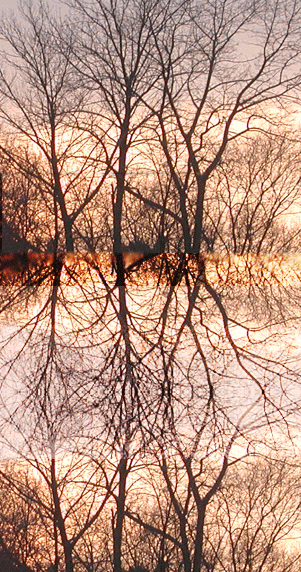 Images of evolution - "getting it less wrong"?
Images of evolution - "getting it less wrong"?
Evolution as an "(attempt to) describe places and times outside of human scales"
Shorter time scales ALSO important for biological systems - milliseconds, nanoseconds (change where not aware of it)
Have at small scales, beginnings of an explanation of one fundamental characteristic of life: change, exploration? Have also, at large time scales, some explanation of "adaptiveness", and of "clumpiness"/diversity
To be continued
| Biology 103
| Course Forum Area | Biology | Serendip Home |